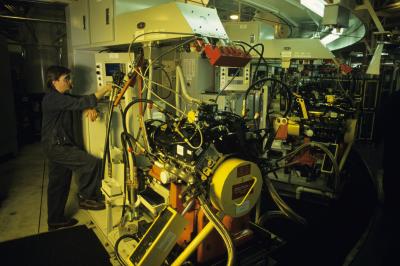
Diesel engines may just be gas engines with high compression and no spark plugs, but they live on a whole different planet in terms of tuning and function. Diesel engines have hypothetically unlimited power potential, but in practical terms they're limited by how much thermal energy they can withstand before melting into a puddle of cast iron. Dropping exhaust gas temperatures isn't just vital in terms of engine longevity, it also opens the door to increasing power by eliminating the engine's primary restriction.
Retune your computer to run at a leaner air/fuel ratio. Diesel engines are fuel-throttled, meaning that to make more power, you need only add fuel. But diesel engines will eventually hit a wall in terms of airflow; once you run out of air, the mixture goes rich and the excess fuel in the cylinders continues to burn as it exits the exhaust valve. That's bad news for your engine and turbo, because those still-burning gases end up trapped in the exhaust manifold between the engine and turbo. Aftermarket "power tuners" make power, in part, by dumping more fuel into the engine; however, many tuners have an "economy" or "cruise" program that leans out the mixture to enhance fuel economy and lower EGTs.
Install a complete exhaust system running from the turbo to the catalytic converter -- the "downtube" section -- and from the catalytic converter to the tailpipes. Apart from a retune, no single upgrade you can install will drop your exhaust gas temperatures quicker or more efficiently than a free-flowing exhaust system. Additionally, you're sure to pick up some horsepower, torque through quicker turbo spooling and fuel economy through increased combustion efficiency. Expect a 200- to 400-degree drop in EGTs with a full aftermarket exhaust.
Purchase and install a quality air-to-air intercooler or install a larger-than-stock intercooler if you already have one. Compressing air with a turbo or supercharger causes its temperature to rise. An intercooler is essentially a radiator that sits in between the turbo and engine, and it can easily drop inlet air temperatures by 100 degrees or more. This drop in air temperature alone won't decrease combustion chamber temperatures, but it will increase oxygen density in the intake tract. Increased oxygen density means a leaner air/fuel ratio, and that means lower temperatures in a diesel. A good intercooler will drop EGTs by 100 to 200 degrees vs. no intercooler, and about 100 degrees vs. a stock intercooler.
Inject your engine with water, a 50/50 mix of water and methanol or propane. This time-tested method of chemical intercooling works particularly well with diesels running right on the threshold of EGT meltdown. Injecting water into a running engine may seem kind of dumb, but a fine mist of H2O in the airstream will quickly absorb thermal energy and ferry it out of the engine. The downside to water injection is that water (obviously) doesn't burn and may actually cost a bit of power if you don't increase boost to take advantage of it. The alternative here is to inject propane, which -- as a fuel -- will add 50 to 100 horsepower while simultaneously absorbing heat from the combustion chamber and dropping EGTs.